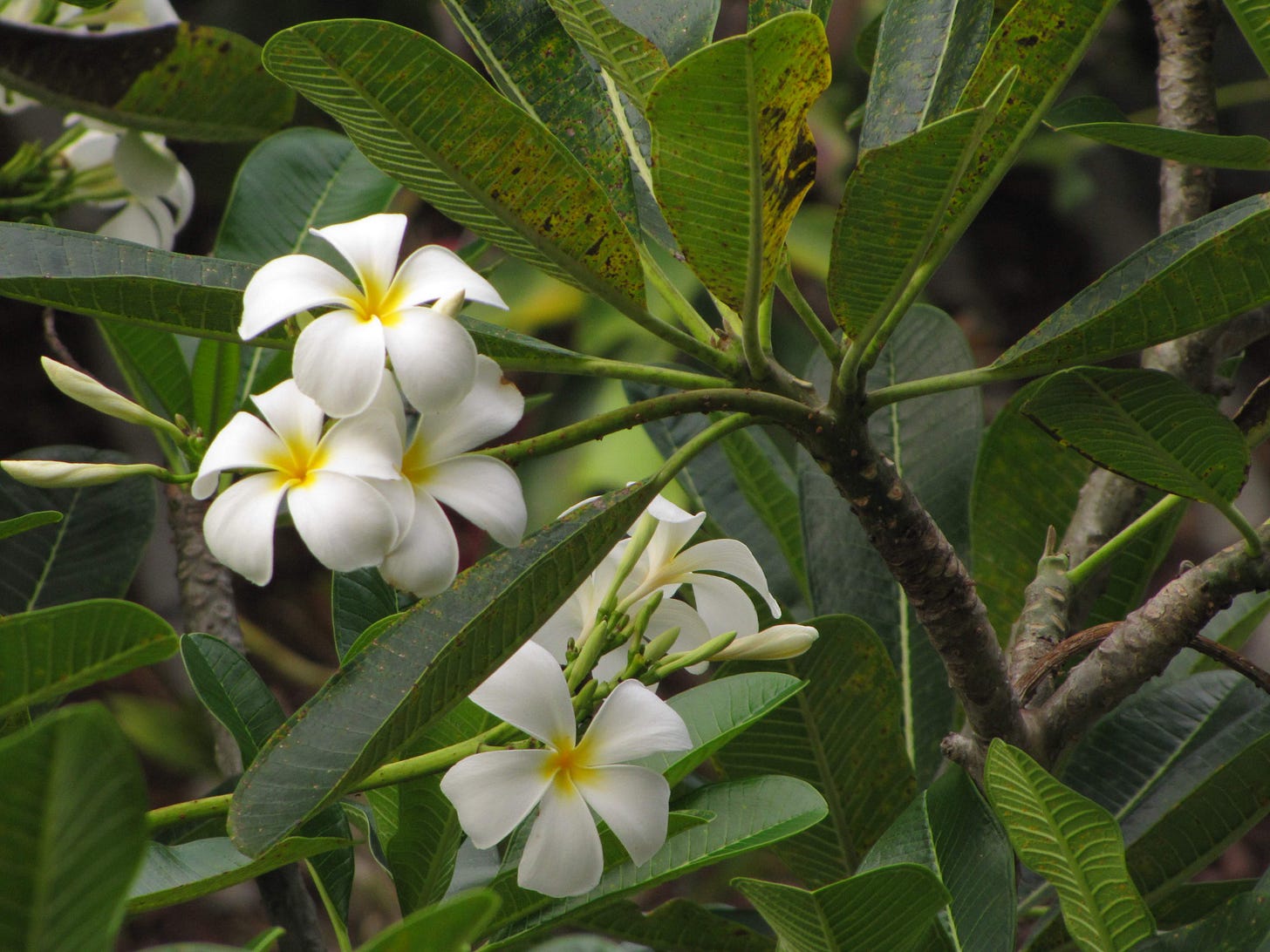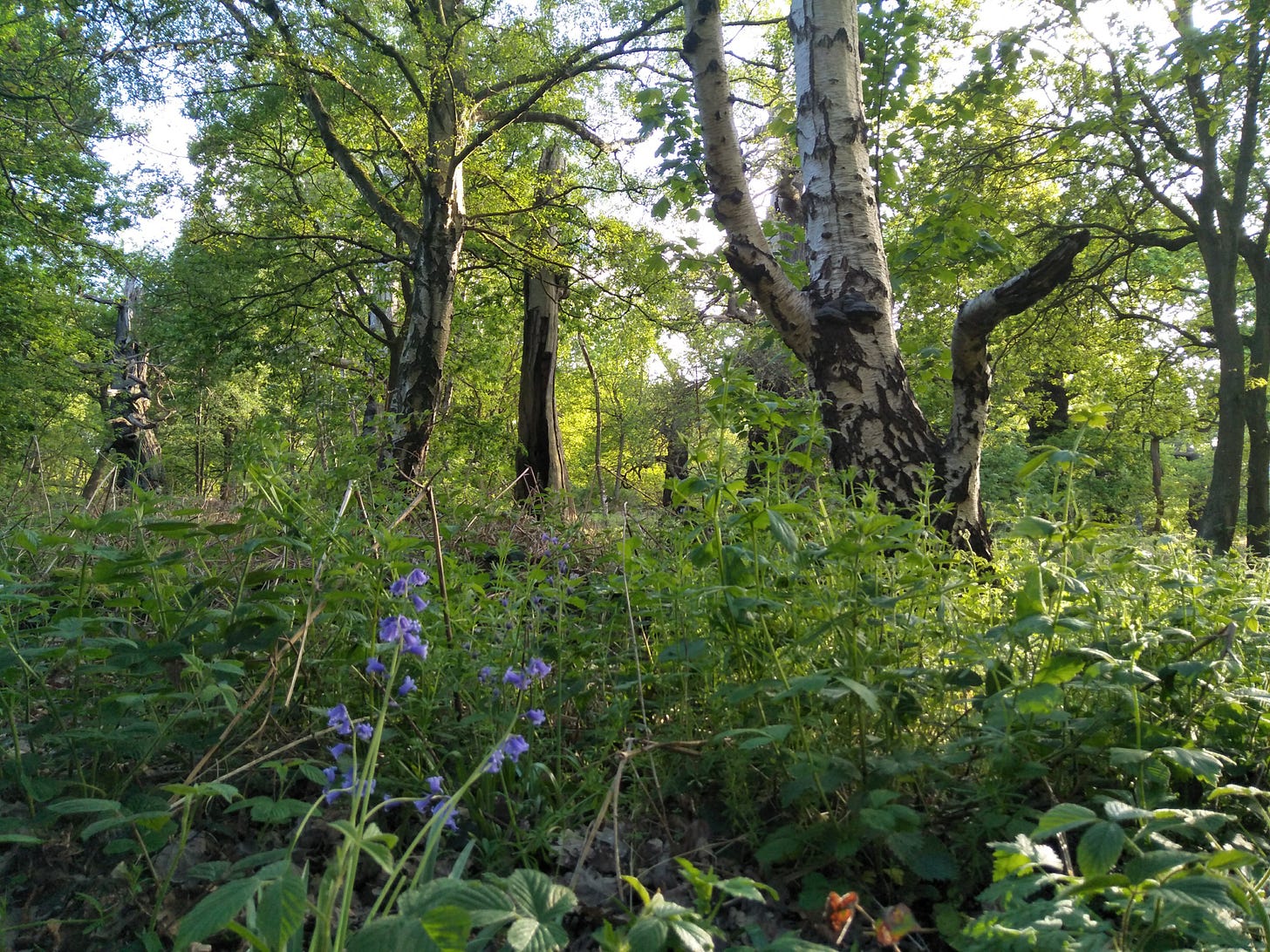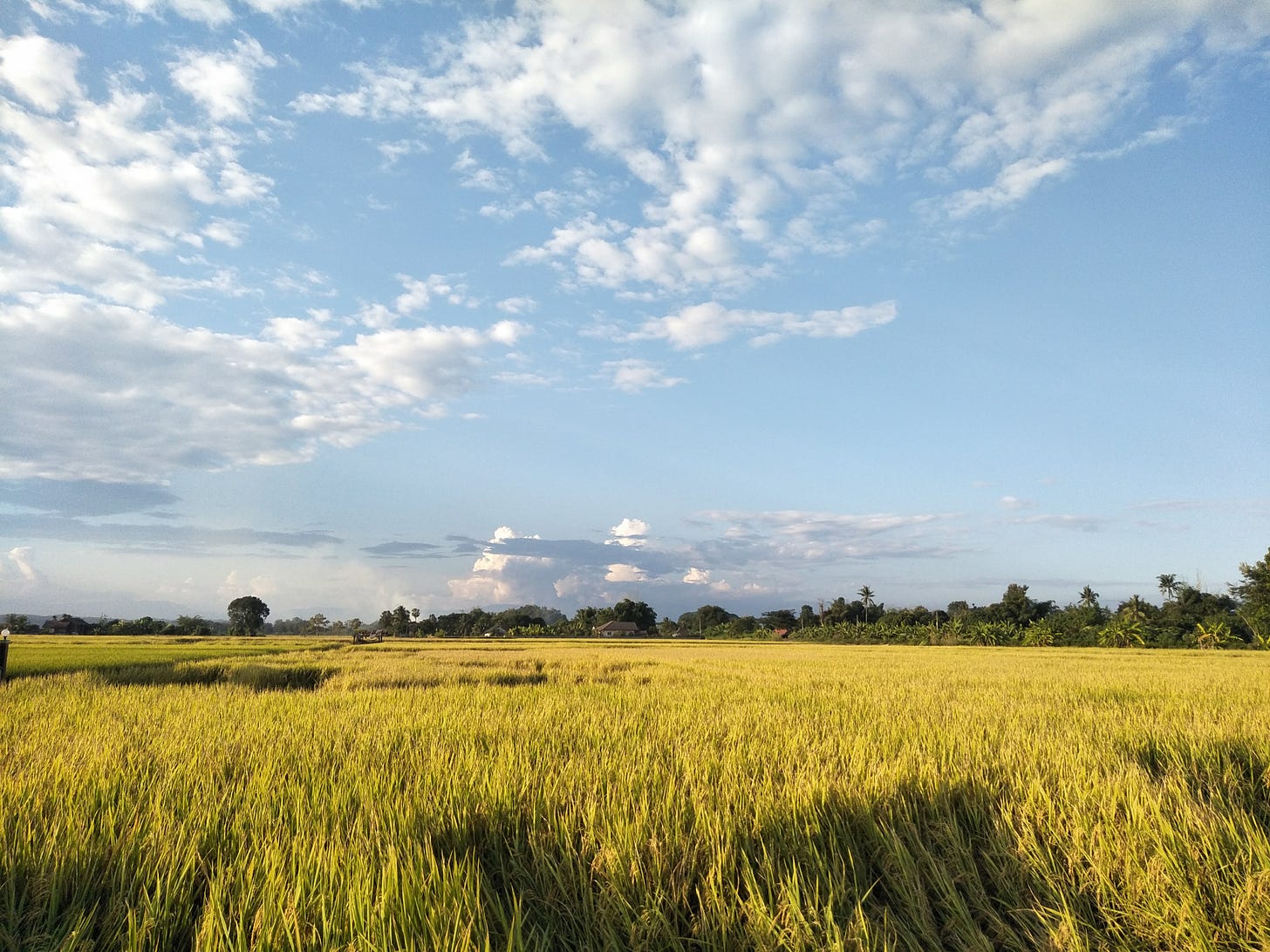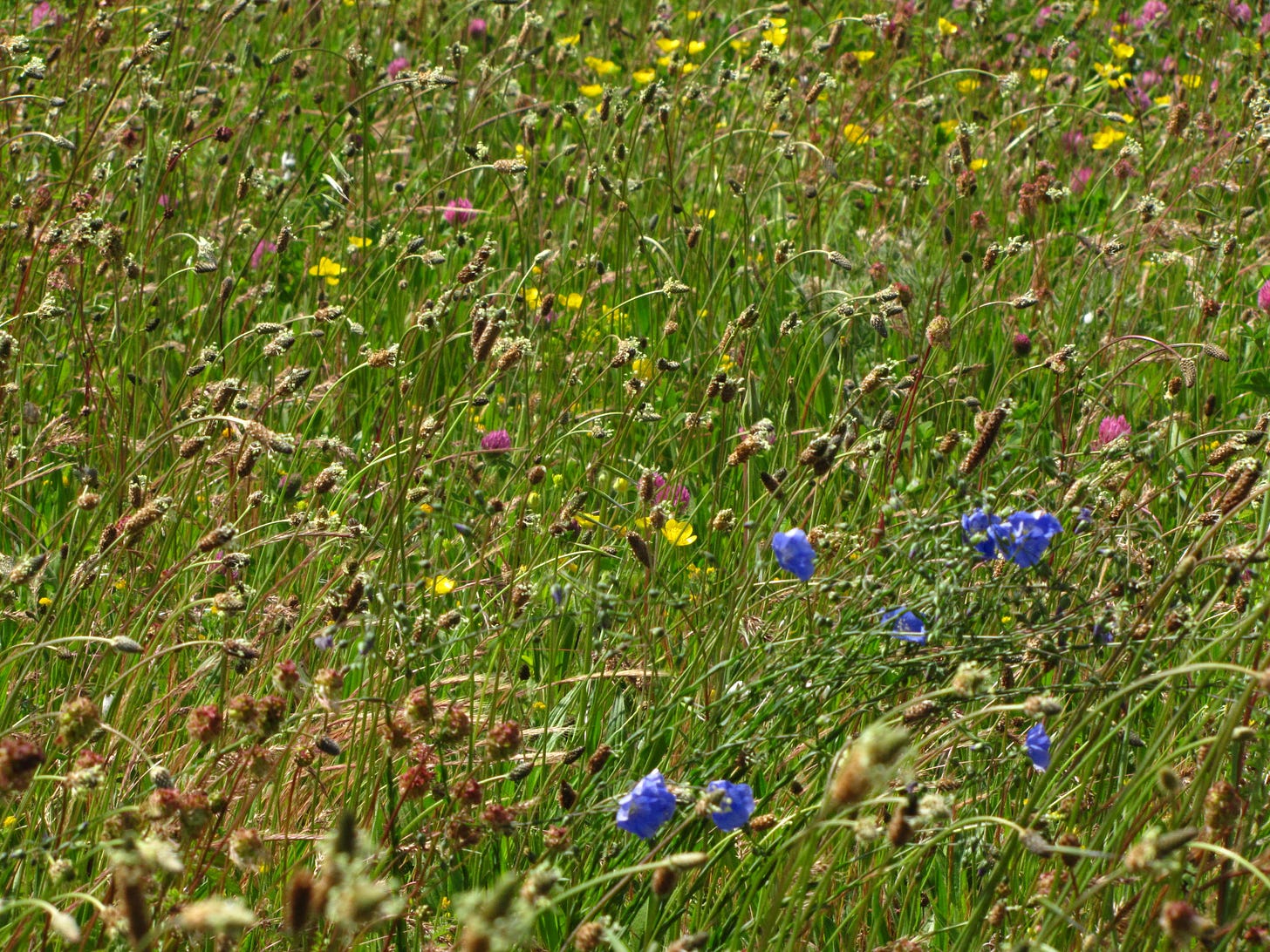The Outnature: Mental Health Awareness
A Very Personal Perspective
When I loosely planned the pieces I wish to share here in the coming months, I switched from a weekly offering of Edges and Entries to once every two weeks. I did this, as it makes sense to keep sending my letters on the same days—Fridays for fiction, Wednesdays for everything else. I can post my second season of Ancestral, Wild Empowerment (AWE) in between the letters talking of the Underworld, but I can also share other things.
Sometimes, I suspect, these will only be brief letters, postcards if you will, similar to those shared by
over at A Hill and I (with a thank you nod to Barrie at too!). I have much I need to do this year, and little time to do so.At other points, however, you can expect something longer, such as the recent micro-season discussing travel, which can be found here. I have been writing on the internet for well over twenty-five years and not on the internet for even longer. As such, I have a wealth of work which is currently unavailable anywhere but in my own archives, which is a shame.
The idea is I can dust off some of those posts, edit them when needed (some might need more editing than others), and give them a proper home here. I feel sorry for these unreadable words, so this seems a good use of (much less) time, and space.
I can also use this gap between Edges and Entries to share other, new work.
This post is one of those—a very personal perspective on mental health awareness.
In the US, May is Mental Health Awareness Month which, to me, seems a good time to hold such a thing, as the spring weather here in the north makes some of us come back to life after the darkness of winter.
In the UK, the 13th to the 19th of May is Mental Health Awareness Week—for some reason, mental health only deserves a week’s awareness over there…
(Interestingly, both the US month and the Mental Health Research Fund, which was the proto-organisation behind the present Foundation which runs the UK’s week-long offering, were founded in the same year—1949. I do not have the time to research this, but my guess is that there was a glaring need for both, following the end of the second world war, a need which has only grown in the years since.)
I was first diagnosed with Seasonal Affective Disorder (SAD) while living in Orkney and still at school. In Orkney, an archipelago of islands beyond the north coast of Scotland and south of Shetland, the winters are dark: at times very, very dark. The sun would not rise until I was in school, under artificial lighting, and it would set before I left. Lunchtimes and breaks were nearly always spent indoors, as the weather was often wet and nearly always windy.
Summers in Orkney, the evenings stretch out to greet the early mornings, the grimlins, as they are known—Scotland’s the gloaming, Shetland’s da simmer dim—when the sun set but didn’t descend far, hovering just below the horizon for a few hours, before popping up early in the morning. I slept much less in summer, and needed much more sleep in winter. It was one such summer morning I recently shared in Edges and Entries: a tale of what can happen when the sun wakes you so very early.
I would get lower and lower during the winter months, a stock of excess sunshine procured during the summer, and the midwinter Christmas and New Year celebrations enough to keep me relatively buoyant until mid-January, when those winter blues would really kick in. I was young, to have to learn how to live with this and, coupled with all the joys of teenage hormones, it was not easy, by any stretch of the imagination. Around the same time, I began to experience migraines with aura—the same as those my dad had, so I at least had an idea what was happening when first I lost part of my vision, to then be crippled by the worst headache imaginable.
Later, when I was in my twenties, I was diagnosed with chronic, severe anxiety and depression and given a choice whether I wanted to be prescribed pills or see if I could find my own coping strategies. Ironically, it was the fact I was not coping which had driven me to the doctor—doctors and medical institutions are something I can struggle with—but I left without a prescription because, at the time, I thought at least I now had some sort of proof I was not just making it up: I couldn’t simply think happy thoughts and all would be well, despite what I’d been told. If I am honest, I was also scared of the pills, having heard horror stories from others. Now, I sometimes wonder if the tablets might have been better route to follow.1
Often, friends, family and acquaintances are only too pleased to offer suggestions of how to cure such an affliction. Try exercise, change your diet, get outside more, maybe take up a hobby? Have you thought of mindfulness, or keeping a journal? What about watching movies which you know make you happy, or listening to music which does likewise? Drink more. Drink less. Maybe just try thinking happy thoughts?
These suggestions are usually passed along with all the best intentions in the world, as though I’d never considered any and all of those options but, when you are chronically depressed, all those coping strategies mean very little when just to get out of bed in the morning is akin to climbing a mountain whilst wading through treacle and carrying rocks. Backwards.
I just couldn’t care, I just couldn’t find any emotion other than a numbness, a shroud of grey and a fear that maybe this was what life was, with nothing on the other side.
Interestingly, now, I realise it is only when I know I am moving beyond my worst that I feel I can talk about my mental health. When I am down there in the depths, that numbness also translates to being unable to communicate exactly how severe depression can affect day-to-day life: it is too much work to do so, too exhausting. As I discuss below, it would simply strip that day of all its spoons.
Over the years, I have learnt how to keep a weather eye on my emotions, on those little cues which suggest a slide downwards. There are patterns, and I can sometimes trick them but, eventually, I will experience another low. The clue is in the word chronic. It doesn’t go away: it lurks or it clutches, but it doesn’t go away.
One of the very best ways I have seen to describe how a chronic condition affects day-to-day life is that of The Spoon Theory. Originally created by Christine Miserandino, the basic idea is that a chronic illness—in the case of Miserandino, lupus, in my case, anxiety and depression (and one or two other issues)—means each day we are given so many spoons. Everything we do uses spoons, whether getting out of bed, or taking a shower, or going to work, or calling a family member. Everything has a spoon-price, as it were, and the chronically ill have far fewer spoons in their drawer than those who are not.
Spoon theory has become an accepted part of discussing chronic illness and those of us it affects certainly owe Christine Miserandino a debt: she has made discussing these issues that little bit easier and, as such, use fewer spoons when we do so. (I would wholeheartedly recommend you read the original Spoon Theory essay, available here.)
I am lucky (“lucky”!), in that my own issues are mostly cyclical—during a low, I have a very limited supply of those spoons but, when I am at the other end of the cycle, I have a greater number, as many as (or sometimes even more than) someone without a chronic illness. And, when I am in a depressive cycle, I can always remember that there will come a time again when I will feel different, even if the actual feeling and memory is masked by the depression. I just keep going, as best I can, try and derive as much joy as possible or, more accurately, still do joyful things, even if I cannot register them thus: eventually something will get through the fog once more.
Every day, I track certain habits—and have done for some years. When I start to see a lack of crossed boxes, I know I am in danger. Not that there is always something I can do about it and, sometimes, rather than seeing that lack, I simply stop tracking the data. That is when I am at my lowest.
Winter is always the hardest—SAD as I am, it piles weight upon an already heavy burden. It steals further spoons, hidden by the darker months, lost down the back of a drawer, no sun to help see. I lose the will to go outside as I should, further encouraging that downward spiral, easier to stay in my den, hibernating.
The winter of 2022/2023, I started to feel myself slipping down, but pulled up a bit in summer. Hours spent out in the sunlight charging my batteries, gifting more cutlery, before later in 2023 I drifted lower and lower still. It could be argued that there were several triggers for this but, mostly, I suspect it was simply my time for another low.
I had cheated my body and mind by throwing all into a spin, leaving Scotland for other places over seven years ago—places with considerably more sunshine. This last, happier phase was considerably longer than those which had gone before but, eventually, a chronic illness claws its way back into the light from wherever it hides, blanketing all in its haze of misery and sadness. I could go into further details of how I am made to feel during such an episode, where my spoons need to go, what suffers when I run out but, in all honesty, at this point I do not feel those details really matter. It is the overarching idea and fact which does.2
Why am I telling you this? Why am I hitting send on a letter which goes out to over one and a half thousand people, and sharing it in other places too? Should I not keep this a private matter, as we are so often told?
The why is actually rather simple—I believe, I know, we need to share these things. If we don’t talk of mental health, it makes it much worse for others (and ourselves). It is an ancient magic—by naming a thing, you take away a portion of its power. So it is with depression and anxiety.
I have spoken of this before, many times, been open with how this affects me but, recently, it occurred to me that I should have a dedicated letter on Substack to do so too, something which I can link to in the future, something which might actually make a difference to someone else. We are rarely alone in suffering, even if that is precisely how it feels at the time.
Living in France, married to a French woman who is the world to me, with a daughter who is a sheer delight does, however, mean I have no native English-speaking network around me. I use the internet for this and, over the past year, that has increasingly meant my Substack letter and Substack Notes. You are my people, my community. I have friends from other times, other circles, some of whom understand how my mental health affects that friendship, others who might not have a clue, but keeping up with relationships is often one of the first things to suffer when a low comes a-creeping through the night. And, in general, I’m pretty terrible at keeping in touch with people anyway—again, perhaps explained by my mental health.
Overall, I have kept a relatively good schedule here with my letters, even when I have been crushingly low, even when I am struggling. That is a good thing—knowing I can hit a deadline like this, knowing I can queue and share an episode of a story with you, or talk about nature, liminal spaces, ancestral ways, or my own mental health, only serves to give me strength. Seeing comments and restacks, hearing how some of you enjoy my words, that can even give me an extra spoon, as can the fact I know many more of you regularly open and read my letters, even if you don’t comment or restack—and I love that, thank you, all.
The opposite is also true—losing subscribers, for example—but that is easier to ignore: I just don’t look at the numbers. Amusingly, when I recently ran my 1500th subscriber giveaway, however, and was therefore forced to keep an eye on them, I noticed I reached 1506 subscribers the same day as I hit 1500. Since then, having a peek today, I can see I’ve lost so many subscribers as to dip back to 1499, or lower, again and again over the last two weeks—people are still subscribing, several a day (30 since hitting 1500), but it appears many others are leaving. And that is okay—I do not want anyone to stay who doesn’t want to read and receive my letters, after all!3
I am old enough and (relatively) wise enough to know comparing myself to others is a road to nothing but misery. Last year, on this day, I had 660 free subscribers, and 0 paid. To achieve such a growth is simply fantastic, and those are the numbers I focus on. And, I dare say, so should you.
When I started to seriously consider my direction here on Substack, altering those monthly posts to friends and family, and looking at other ways to share my words, I knew one thing I wanted to talk about was how I believe a knowledge and absorption of the skills and ways of our ancestors can actually affect our mindset even today, in our ultra-modern, busy lives. I knew this was important, because I know how it worked for me. Yet, as I sketched out the first season of AWE, I did not realise I was going to be entering the second keen to pull my own self out of the mire of depression, cut myself free from those insidious tendrils of a depressive episode, and use my axe to hack at the amorphous clutches of anxiety and a lack of self-worth. Yet, here we are (and with far too many metaphors—Ed.).
In part, this post was inspired by the work of
who, over on Instagram is combining Mental Health Awareness Month with National Walking Month. I also really appreciated a recent post from , in which she discussed unpacking and examining emotional baggage, and finding direction and healing. There are others among you who are also sharing your own discussion of mental health, and I think that is a powerful, wonderful, thing.I wonder how many of us, those who feel we are missing something from our lives, something ancient and wonderful, also suffer from mental health related issues and episodes?
We are meant to be outdoors and, even calling it that, to me, is wrong. ‘Out of doors’ makes it sound as though being away from the home is the wrong state to be, divorced from the walls and doors when, actually, out of nature—outnature, if you will—would be a better descriptor of how we are when we are surrounded by walls, by the pressures and accruements of modern living.
Being outnature does not help me, yet when I am low it is easier than stepping out into the woods. As I said, I hide away, I want to hibernate and, as such, I do not see the sun, I do not feel its light or warmth on my face as I should, as I need.
As I craft AWE2 over this coming season, I will be referencing and referring back to this post and my own history of how modern life has at times felt more like a prison than the wonder it should be.
It is all too easy for some writers or outdoors people to say they wish themselves back in another era and I’d like to clarify: I don’t—even if I suspect I wouldn’t be living with such a chronic condition—I quite like not dying of plague, or smallpox, or a simple infection, I love the fact I’m unlikely to be eaten by a cave lion or leopard in the night, and I love how I can tap a small button and talk to all of you in this manner.
To be able to take a thing—the birthright of those ancestral skills, how to live in and with the nature, rather than the outnature—and share it like this, show how it is still relevant and still deeply, truly, empowering, is a miracle of our modern world. And, wonderfully, I see echoes of this all over the corners of the internet I frequent.
I have talked, over and over, about active hope, about how simply wishing for a thing to be better doesn’t work, but how we need to pick it up, shake it a little, look at the wiring under the board, then work out how to move forward does. Ancestral Wild Empowerment (and much of my other work) is me being actively hopeful. I know how important sharing this is—and I will hopefully (actively hopefully) be able to demonstrate that from a first-person perspective.
For now, I shall leave this post here. Let’s revisit the topic once AWE2 is complete later this year—and I will be absolutely honest in how (or whether, but I do like to believe it will be how) leaving the outnature and looking at the world around me with ancient, childlike, eyes has gone for me.
I do hope you will join me on this journey. Any thoughts or comments, as ever, are absolutely encouraged and deeply appreciated.
Many thanks for reading and, if you know someone who might benefit from reading these words, do send them along. I would also ask that, if you think this post might help those who follow you on social media or on Substack Notes, if you could please share there, or restack too—that would be a great thing, thank you.
Until next time, take good care of yourselves and each other; none of us are alone.
Images are, as ever, all mine. Just a selection of pretty, flower and nature related photos from various places on earth, which I thought would fit here!
I have an idea about this, something I would like to try later this year—watch this space for more.
There is much more I could write about my personal experience and write I shall (and have)—but not here, not now. One other point I shall make here, however, is that introspection, examining the self, looking for clues and patterns and hints, never ends. Recently, for example, I have done a lot of research into adult ADHD, in a bid to further try and understand why I am like I am, why certain patterns present themselves and what, perhaps, can be done about it and them. Manage as much as possible, and it can only help.
I do wonder at the number of followers, however, currently 1930, and note the correlation with a slow down in subscriber numbers, compared to a growth in followers. I have not posted to Notes much of late—not enough spoons or time—and I wonder if that also has had an impact. This said, when it comes to these numbers, I am patient and I am aware this is a long game. So what if my paid subscriber to free ratio is currently exactly 0.1%? That 10-15% of conversion we were all touted could also make me feel like I am either doing something wrong, or my words are simply not good enough. Followers only see what I share to Notes, they don’t get my letters—which means if I have no energy or time to keep active there, they aren’t going to know I am still sharing weekly words.











Oh Alex, I applaud you for this! Being vulnerable isn't easy yet so important. And what you just shared I'm sure will continue to be a massive light to so many others.
I feel super honoured that my post inspired you. Really glad it did! Thanks truly for the mention. ❤️
I relate to the seasonal disorder. I'm originally from the tropics and I never knew such a thing existed until I moved to Europe. Spain's weather is utterly friendly compared to what I've felt in my body when I've lived in England or Scotland. Last autumn up here near Glasgow became quickly a struggle as soon as November hit. It only takes a week for the darkness outside to affect me deeply. I never knew such an intense thing could happen to the body with the lack of light. In Costa Rica the time and sunlight schedules never change throughout the year, so I was foreign to it all. But then UK taught me about it. It's absolutely freezing and almost impossible to shake that cloud off the top of your head when the weather gets dark and cold outside for so long. One thing that helped me was vitamins, mainly vitamin D and magnesium supplements. They wouldn't take my blues out but at least they'd keep my emotions more at bay through the months. I've never understood how people can manage to live in these latitudes with the darkness, it still riddles me.
Thanks for this post, it's truly needed to keep opening up for mental health. I hope we all can continue to be tiny lighthouses everywhere. The more the merrier! 🎉
Thank you, Alexander, for your candid exploration of your experience. I, too, went through a “functional depression” after the 3.11 quake and nuclear disaster here in Japan and one other time due to work load at the university. I understand the “not having enough energy” to even move, much less get up and be happy (or feel much of anything).
Here in Japan, there are so many problems with mental health issues among the general population and young people in particular. It is not spoken about openly. We’re just now coming to a point where people seek counseling but don’t tell anyone. Most of the time, when it’s serious, the psychiatrists prescribe pills but not counseling. In my opinion, these should go together so that the person can find their own solutions out of the hole.
Thank you for the link to the “Spoon Theory” essay. I look forward to reading it.
Take good care of yourself!